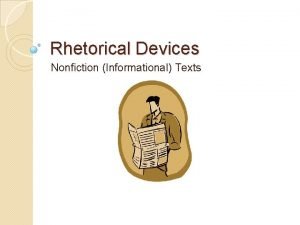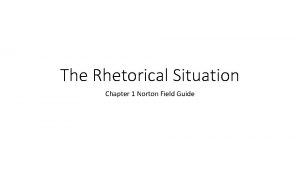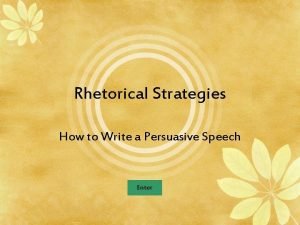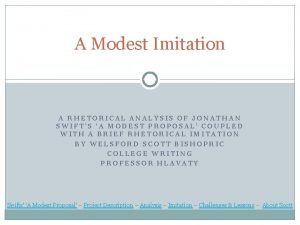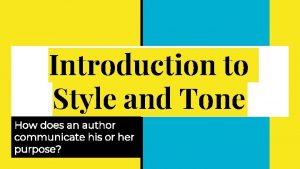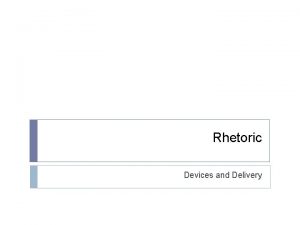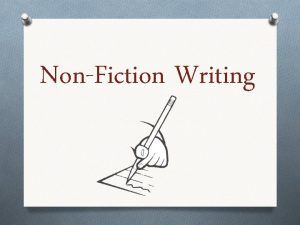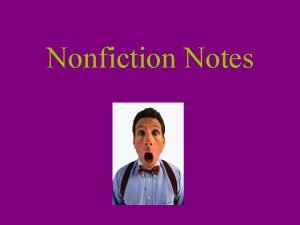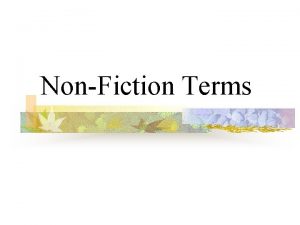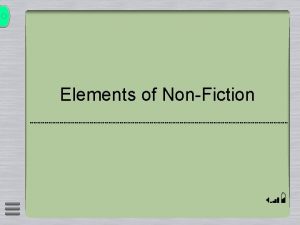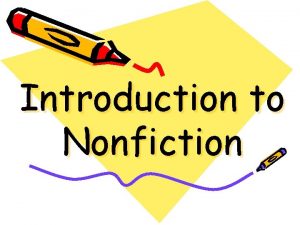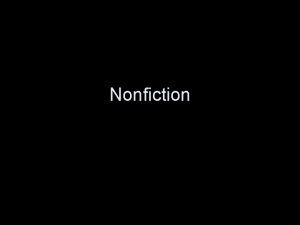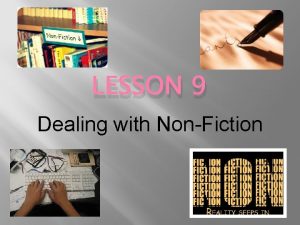Rhetorical Strategies Commonly Found in NonFiction Texts Eng













- Slides: 13

Rhetorical Strategies Commonly Found in Non-Fiction Texts Eng 12

What is a “Rhetorical Strategy”? • A technique that an author or speaker uses to evoke a response in the audience. • These responses are central to the meaning of the work or speech, and should also help get the audience's attention.

Appeals to Pathos • Definition: Verbiage that attempts to influence the listener or reader by appealing to emotion. Hint: Look for loaded words and phrases which have strong emotional overtones or connotations. Appeals to pathos should evoke strongly positive—or negative reactions beyond their literal meaning.

Appeals to Ethos • Definition: Improving the truth/value of an assertion by referencing a figure of authority, knowledge, or expertise.

Appeals to Logos • Definition: Improving the truth/value of an assertion by referencing facts and statistics.

Rhetorical Questions What do you already know about RHETORICAL QUESTIONING?

Rhetorical Questions • Definition: Questions that are posed that do not require an answer. Example: "How much longer must people endure this injustice? ” THINK-PAIR-SHARE WHY might an author use this strategy when developing an argument?

Repetition of Ideas • Definition: Repeating words and phrases for a desired effect -- usually for emphasis or style. Whole Class: Who can think of a current commercial or advertisement that uses “repetition of ideas”?

Analogies • Definition: drawing a comparison in order to show a similarity in some respect. Example: "the operation of a computer presents an interesting analogy to the working of the brain"

Diction • Definition: refers to the writer's or the speaker's distinctive vocabulary choices and style of expression. Diction has a direct influence on the author’s Tone.

Tone • Definition: how the author or speaker conveys his/her feeling about the subject matter.

Allusion • Definition: a figure of speech that makes a reference to a place, historical event, literary work, myth, or work of art, either directly or by implication. (Think historical, mythological, biblical, etc. )

As You Read Think/Record… Are there any OTHER examples of rhetorical strategies that you notice in your Non-Fiction book? • Alliteration - the recurrence of initial consonant sounds - rubber baby buggy bumpers • Antithesis - makes a connection between two things - “That's one small step for a man, one giant leap for mankind. ” (Neil Armstrong) • Epithet - using an adjective or adjective phrase to describe - mesmerizing eyes • Hyperbole - an exaggeration - I have done this a thousand times. • Metaphor - compares two things by stating one is the other - The eyes are the windows of the soul. • Onomatopoeia - words that imitate the sound they describe - plunk, whiz, pop • Oxymoron - a two word paradox - near miss, seriously funny • Parallelism - uses words or phrases with a similar structure - I went to the store, parked the car and bought a pizza. • Simile - compares one object to another - He smokes like a chimney. • Understatement - makes an idea less important that it really is - The hurricane disrupted traffic.
 Funksiyaning eng katta va eng kichik qiymati
Funksiyaning eng katta va eng kichik qiymati Rhetorcal devices
Rhetorcal devices Nonfiction reading strategies
Nonfiction reading strategies Examples of pathos
Examples of pathos Norton rhetorical strategies
Norton rhetorical strategies Repetition definition with examples
Repetition definition with examples A modest proposal rhetorical appeals
A modest proposal rhetorical appeals What rhetorical strategies are used in paragraph 25
What rhetorical strategies are used in paragraph 25 Anaphora in patrick henry's speech
Anaphora in patrick henry's speech John smith letter to queen anne analysis
John smith letter to queen anne analysis Rhetorical choice
Rhetorical choice Syntax rhetorical definition
Syntax rhetorical definition Agaricus characteristics
Agaricus characteristics Sodium hydroxide relaxers are commonly called
Sodium hydroxide relaxers are commonly called

